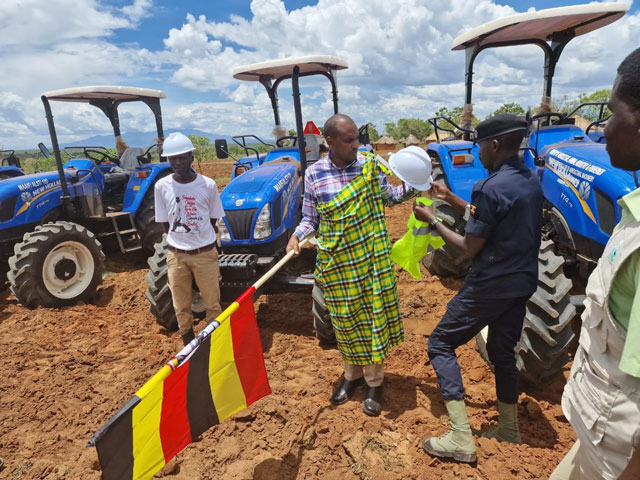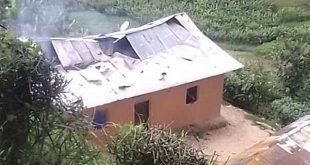
Gov’t Tractor Hire Scheme Frustrates Farmers, Leaders in Karamoja
Nabilatuk, Uganda | THE INDEPENDENT | Some of the tractors procured by the government to boost mechanized agriculture in the Karamoja sub-region are grounded.
In April 2023, the Ministry of Agriculture launched a tractor hire scheme in the Nabilatuk district to support farmers in the Karamoja sub-region to boost food production. The ten tractors were delivered to initiate the pilot study, and six more tractors were added later to cover all nine districts of Karamoja.
In last year’s season, the project registered some progress, where over 2,800 acres of land were plowed within the districts of Nabilatuk, Nakapiripirit, and Napak while other districts missed out.
Despite calls for additional tractors, some tractors have broken down and are parked at Nabuin Research Institute waiting for repairs.
Joseph Lokol, the LCV Chairperson of Nabilatuk district, wondered why the Agriculture ministry left the tractors to break down at a time when farmers were in dire need of the services as the farming season started.
Lokol said that he was shocked to find out that out of 16 tractors, 11 were grounded at Nabuin Research Institute.
Lokol observed that the previous private tractor-hire scheme performed better because they were deployed at the parishes and fully serviced. He revealed that the current hiring scheme is failing because it is not supported by the people responsible.
Lokol said that the ministry is silent about the 55 tractors which were donated to Karamoja by the Food and Agriculture Organization.
Lokol urged that the government privatize the scheme or have a public-private partnership to manage the project if they are to achieve their objectives.
Joseph Nangole Lobot, the LCV Chairperson of the Amudat district, acknowledged that the tractor hire scheme has never benefited his people since the project’s inception.
Lobot said that they had suggested that the tractors be allocated to each district and not be held in one center, as per the policy.
He added that the tractors have only covered three districts in the entire region, while some of them rely on private tractors. He said that the private tractors used to charge between 90,000 and 100,000 shillings for an acre, and farmers were comfortable.
Lobot said that the farmers are greatly affected because the Kenyan tractors are no longer allowed to enter Uganda unless they are cleared by the URA. He said that the tractor operators initially had to move to the Suam border, where they pay a fee of 4.5 million shillings.
Lobot noted that they spoke to the URA Commissioner, who directed the farmers to write a request letter detailing the number of tractors, the drivers, and their location.
Christopher Lolem, one of the farmers from Lobongia sub-county in Kaabong district, said that they do not have any information regarding the government tractor hire scheme.
Lolem said that they only depend on individual tractors from other districts such as Mbale, Teso, and some that cross from the Kenya side. He said that farmers pay up to 120000 shillings per acre.
Lolem faulted the officials from the Agriculture Ministry for failing to understand the climate of the region when implementing their projects.
Lolem suggested that the tractors should have been under the management of the sub-county authority, which the farmers can easily access. He said that the sub-county could formulate a committee that would be responsible for the hiring scheme.
Thomas Otim, a farmer from Lokopo sub-county in Napak district, said that they last heard about the tractors scheme in last year’s cultivation season, and it never reached his sub-county.
Otim said that they heard the tractors were taken to the areas of Lorengecora and Nakichumet, but they never reached their areas.
Robert Nangiro, a farmer from Lotome sub-county, said that he is in dire need of a tractor to open up his fields, but there is no chance for him.
Nangiro noted that sometimes the tractors from the hire scheme are only used by the top officials in the government and not by local farmers. He appealed to the government to give them tractors which will be based at the sub-county or parish level for easy accessibility.
Nangiro said that the government should look into the issues affecting mainly the smallholder farmers who own land but lack resources for farming.
Godfrey Ochan, the Agricultural officer for Lotome sub-county in Napak district, said that the farmers have started preparing their gardens ready for this year’s season.
Ochan said that the farmers are forced to use the oxen and hand hoes for opening up lands, while those with money hire tractors from private firms.
He observed that the lack of tractors is a big burden to small-scale farmers because they have huge chunks of land but lack resources for plowing. He added that the farmers would be able to produce a lot of food if they had access to tractors and timely delivery.
Walter Odongo, the Director of Research at Nabuin Zonal Agricultural Research and Development Institute, said that they are serving both smallholder farmers with two acres and commercial farmers without 10 acres.
Odongo noted that they are working with other development partners who are helping in mobilizing farmers into groups for easy management. He said that they also have a block farm that could have over 100 acres for 30 farmers, also revealing that they have a fleet of 15 tractors and one meant for harrowing for the hire scheme.
He said that most of the tractors had broken down, and they had to look for resources to fix them. He said that they have so far seven functioning tractors operating in the districts of South Karamoja, and an additional six will be set in the field as demand rises.
Odongo is optimistic that this would enable them to deploy the tractors in all the districts, especially the distant ones that were unreachable.
***
URN
 The Independent Uganda: You get the Truth we Pay the Price
The Independent Uganda: You get the Truth we Pay the Price



